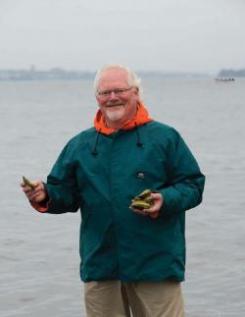
The “Dragon Lady” did it for Jeff Davidson. “I didn’t live near the sea. I grew up near the bush in northern Ontario. Maybe it was Jacques Cousteau and all that—but my original interest was in marine biology.
I never even touched a cow until I was 18. One day, in my second year at Guelph, I asked one of my professors, a formidable character we called the Dragon Lady, what my job prospects would be if I continued on in marine biology. She said if I did really well and got an honours degree or a graduate degree I’d be able to work for her. And I thought, ‘that’s it.’ That’s when I decided I was going to be a veterinarian.”
His early career was mostly private practice, and mostly large animal. “But in the late 1970s when everybody was going west—same as they are now—I decided I was going east to take a look.”
A job offer during a meeting in a Charlottetown restaurant saw him packing his bags and taking up private practice in the PEI capital.
“Since coming to AVC there has been no shortage of opportunities. I get up in the morning wondering what I’m going to do next. And every day I find out.” These opportunities have brought him full circle and led him to a number of marine projects. As a Professor in Health Management he is now known for his work with shellfish and crustaceans.
“I sail in the summertime, and I like biking and reading. And, although it started as a hobby, I love working with oysters. I grew them for a number of years, until about five years ago. I got a little processing plant and sold them and the hobby soon turned into a job so I sold it. But I wanted to know the industry. I wanted to know what they went through so I could talk sensibly and they’d find me credible.
“I also have my master’s in epidemiology but I’m not a classical epidemiologist. I’m more of an industry-based researcher—I work with everything.” He continues to work with oysters, mainly with the public fishers in the Bedeque Bay area because of the increasing mortality in the wild fishery. “I’m looking at everything from food supply to siltation and eutrophication—runoff from the land.
“But my biggest project is on tunicates. They are an invasive species—and have become a huge part of ‘the file’ now. We’re concentrating on it because the mussel industry is in crisis.”
Tunicates overgrow mussel crops and increase the cost of production both for the producers and for the processors, causing the mussel industry to struggle for survival. Davidson and his colleagues in AVC’s Shellfish Research Group are looking at the tunicate’s life cycle, how they reproduce, how they grow, when they grow, and why they find PEI waters attractive. They are also looking at mitigation strategies and how to manage them and decrease the numbers enough so mussel aquaculture is still viable.
“We have a project with Spain—they have the biggest mussel industry in the world—and they have the tunicate species we have, plus a few more. The Spanish industry isn’t affected by the tunicates to any great degree, and we want to know why.”
Davidson is also working with Russ Kerr, the Canada Research Chair in Marine Natural Products at UPEI, looking at bio-fouling: trying to find compounds from natural ingredients to prevent the tunicates from settling on the mussels and gear. “We send our divers out and collect samples for him of sea invertebrates. We also take these tunicates in and spawn them to get a pure culture of larvae that he can test with. We’re going to be doing field trials and once he has found something that he thinks works in the laboratory, then we’re going to be working with him there. We’re also looking at molecular techniques to identify tunicates in the water column before we can actually see the adults. If we can identify them as larvae perhaps we can mitigate or stop the spread.
“It fascinates me that a disease or aquatic invasive species can have such a profound effect on the marine ecosystem and aquaculture.
“We’re working with haemic neoplasia, which is a disease in soft shell clams that can cause up to 95 per cent mortality in a population. For years when clam populations would suddenly disappear people thought it might be due to overfishing, but upon investigation it was caused by this disease. It’s always there, but there have to be certain environmental conditions to express it. We need to find out what.”
Another of his research interests is disease in cultured shrimp. White spot syndrome virus has devastated the shrimp aquaculture industry worldwide. “We’re doing epidemiological studies in Thailand looking at best farm management practices to decrease the effect on the shrimp farms.”
Davidson works with Veterinarians Without Borders Canada. “Our group was formed just before the tsunami. Because I’ve travelled and worked there, I’m the Southeast Asia co-ordinator. It’s a good opportunity for the countries themselves to increase expertise in different areas, but the same is true for our students, who accompany me on trips to Thailand, for example. I think at this stage in my life it would be nice to contribute, not just in aquatics, but also by using the expertise from Canada, the veterinarians, to help those who need help.”